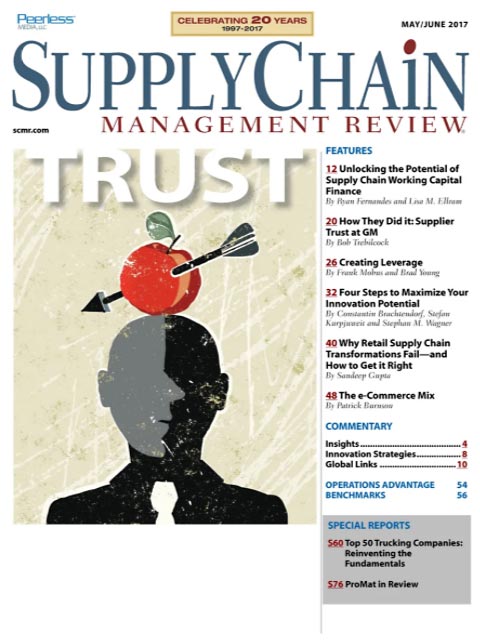Sorry, but your login has failed. Please recheck your login information and resubmit. If your subscription has expired, renew here.
May-June 2017
Trust hasn’t always been an element in supplier relationships; all too often buyers have been encouraged to carry a big stick and get tough with suppliers to get the best price—no matter the cost. That approach to procurement is beginning to change. Browse this issue archive.Need Help? Contact customer service 847-559-7581 More options
It must have been a huge shock for suppliers. During the heart of the recession in January 2009, beverage giant Anheuser-Busch InBev extended its payment terms from 30 days to 120 days with less than a month’s notice, giving suppliers no time to prepare.
We don’t know exactly how the suppliers responded, but looking at Anheuser-Busch InBev’s financial statements, we know that its trade accounts and other deferred expenses payable went from $4.833 billion to $5.657 billion between 2008 and 2009. That freed up $824 million in working capital for the company. Assuming that it was InBev’s smaller, less powerful suppliers that collectively lost that working capital, they probably also incurred financing costs of around $123 million, all told.*
Around the same time, global beverage giant Diageo went from 30 days to 60 days payment, with no warning or offsetting compensation for its suppliers. Many other large companies, including Johnson & Johnson and Tesco, used the global financial crisis as a rationale for extending terms—even on previously negotiated contracts—and for aggressively monitoring collections from their debtors.

This complete article is available to subscribers only.
Log in now for full access or start your PLUS+ subscription for instant access.
SC
MR
Sorry, but your login has failed. Please recheck your login information and resubmit. If your subscription has expired, renew here.
May-June 2017
Trust hasn’t always been an element in supplier relationships; all too often buyers have been encouraged to carry a big stick and get tough with suppliers to get the best price—no matter the cost. That approach to… Browse this issue archive. Access your online digital edition. Download a PDF file of the May-June 2017 issue.It must have been a huge shock for suppliers. During the heart of the recession in January 2009, beverage giant Anheuser-Busch InBev extended its payment terms from 30 days to 120 days with less than a month's notice, giving suppliers no time to prepare.
We don't know exactly how the suppliers responded, but looking at Anheuser-Busch InBev's financial statements, we know that its trade accounts and other deferred expenses payable went from $4.833 billion to $5.657 billion between 2008 and 2009. That freed up $824 million in working capital for the company. Assuming that it was InBev's smaller, less powerful suppliers that collectively lost that working capital, they probably also incurred financing costs of around $123 million, all told.*
Around the same time, global beverage giant Diageo went from 30 days to 60 days payment, with no warning or offsetting compensation for its suppliers. Many other large companies, including Johnson & Johnson and Tesco, used the global financial crisis as a rationale for extending terms—even on previously negotiated contracts—and for aggressively monitoring collections from their debtors.
SC
MR


More Finance
- Investor expectations influencing supply chain decision-making
- ISM reports manufacturing sees growth in March, snaps 16-month stretch of contraction
- Supply Chains Facing New Pressures as Companies Seek Cost Savings
- February retail sales see annual and sequential gains, reports Commerce and NRF
- A New Model for Retailer-Supplier Collaboration
- How to Create Real Retailer-Brand Loyalty
- More Finance
Latest Podcast

 Explore
Explore
Business Management News
- How CPG brands can deliver on supplier diversity promises
- How S&OP provides the answer to in-demand products
- AI, virtual reality is bringing experiential learning into the modern age
- Tips for CIOs to overcome technology talent acquisition troubles
- There is still work to do to achieve supply chain stability
- Blooming success: The vital role of S&OE in nurturing global supply chains
- More Business Management
Latest Business Management Resources

Subscribe

Supply Chain Management Review delivers the best industry content.

Editors’ Picks





